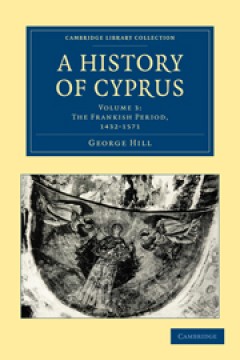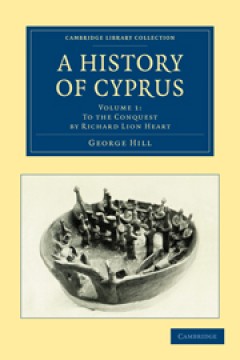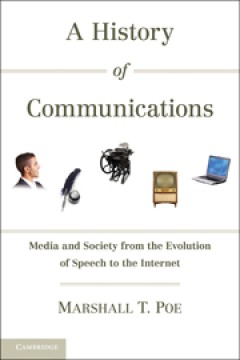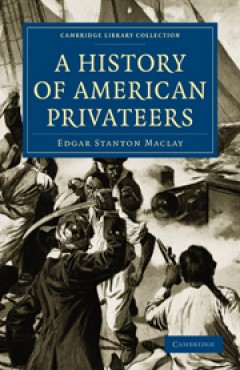Filter by

A History of Cyprus
Sir George Francis Hill (1867–1948), was perhaps best known as a numismatist, although his scholarly interests and accomplishments included a range of time periods and subjects. A classicist by training, Hill built his career at the British Museum's department of coins and medals. In his forty-three years there he produced volumes on coins of antiquity; Greek history and art; coins, heraldry,…
- Edition
- -
- ISBN/ISSN
- 9780511751714
- Collation
- -
- Series Title
- Cambridge Library Collection - European History
- Call Number
- -

A History of Cyprus
Sir George Francis Hill (1867–1948), was perhaps best known as a numismatist, although his scholarly interests and accomplishments included a range of time periods and subjects. A classicist by training, Hill built his career at the British Museum's department of coins and medals. In his forty-three years there he produced volumes on coins of antiquity; Greek history and art; coins, heraldry,…
- Edition
- -
- ISBN/ISSN
- 9780511751738
- Collation
- -
- Series Title
- Cambridge Library Collection - European History
- Call Number
- -

A History of Cyprus
Sir George Francis Hill (1867–1948), was perhaps best known as a numismatist, although his scholarly interests and accomplishments included a range of time periods and subjects. A classicist by training, Hill built his career at the British Museum's department of coins and medals. In his forty-three years there he produced volumes on coins of antiquity; Greek history and art; coins, heraldry,…
- Edition
- -
- ISBN/ISSN
- 9780511751721
- Collation
- -
- Series Title
- Cambridge Library Collection - European History
- Call Number
- -

A History of Cyprus
Sir George Francis Hill (1867–1948) was perhaps best known as a numismatist, although his scholarly interests and accomplishments included a range of time periods and subjects. A classicist by training, Hill built his career at the British Museum's department of coins and medals. In his forty-three years there he produced volumes on coins of antiquity; Greek history and art; coins, heraldry, …
- Edition
- -
- ISBN/ISSN
- 9780511751707
- Collation
- -
- Series Title
- Cambridge Library Collection - European History
- Call Number
- -

A History of Corporate Finance
This study focuses on the role of institutions and organisations in the historical development of corporate finance. The book provides an overview of the evolution of practice in this field from the Italian merchant banks of the Renaissance through the formation of conglomerates and leveraged-buy-out partnerships in contemporary Wall Street. It also puts forth a compelling argument for the clos…
- Edition
- -
- ISBN/ISSN
- 9780511665219
- Collation
- -
- Series Title
- -
- Call Number
- -

A History of Communications Media and Society from the Evolution of Speech t…
A History of Communications advances a theory of media that explains the origins and impact of different forms of communication - speech, writing, print, electronic devices and the Internet - on human history in the long term. New media are 'pulled' into widespread use by broad historical trends and these media, once in widespread use, 'push' social institutions and beliefs in predictable direc…
- Edition
- -
- ISBN/ISSN
- 9780511976919
- Collation
- -
- Series Title
- -
- Call Number
- -

A History of American Privateers
American privateers played a significant role during the American War of Independence and the Anglo-American war of 1812, as the American regular navy was very small. Reinforcement by privateers sailing under the government's jurisdiction carrying Letters of Marque was essential, and in fact both sides made use of privateers, capturing each other's merchant ships as prizes. Many successful sail…
- Edition
- -
- ISBN/ISSN
- 9780511793707
- Collation
- -
- Series Title
- -
- Call Number
- -

A History of Agriculture and Prices in England
Since early times, agriculture has been pivotal to England's economy. This is the fifth in a magisterial seven-volume, eight-piece compilation by the economist James E. Thorold Rogers (1823–90), which represents the most complete record of produce costs in England between the thirteenth and eighteenth centuries. Drawing on a variety of sources including college archives and the Public Record …
- Edition
- -
- ISBN/ISSN
- 9781139094818
- Collation
- -
- Series Title
- Cambridge Library Collection - British and Irish History, General
- Call Number
- -

A History of Agriculture and Prices in England
Since early times, agriculture has been pivotal to England's economy. This is the fourth in a magisterial seven-volume, eight-piece compilation by the economist James E. Thorold Rogers (1823–90), which represents the most complete record of produce costs in England between the thirteenth and eighteenth centuries. Drawing on a variety of sources including college archives and the Public Record…
- Edition
- -
- ISBN/ISSN
- 9781139094801
- Collation
- -
- Series Title
- Cambridge Library Collection - British and Irish History, General
- Call Number
- -

A History of Agriculture and Prices in England
Since early times, agriculture has been pivotal to England's economy. This is the seventh in a magisterial seven-volume, eight-piece compilation by the economist James E. Thorold Rogers (1823–90), which represents the most complete record of produce costs in England between the thirteenth and eighteenth centuries. Drawing on a variety of sources including college archives and the Public Recor…
- Edition
- Arthur G. L. Rogers
- ISBN/ISSN
- 9781139094832
- Collation
- -
- Series Title
- -
- Call Number
- -
 Computer Science, Information & General Works
Computer Science, Information & General Works  Philosophy & Psychology
Philosophy & Psychology  Religion
Religion  Social Sciences
Social Sciences  Language
Language  Pure Science
Pure Science  Applied Sciences
Applied Sciences  Art & Recreation
Art & Recreation  Literature
Literature  History & Geography
History & Geography